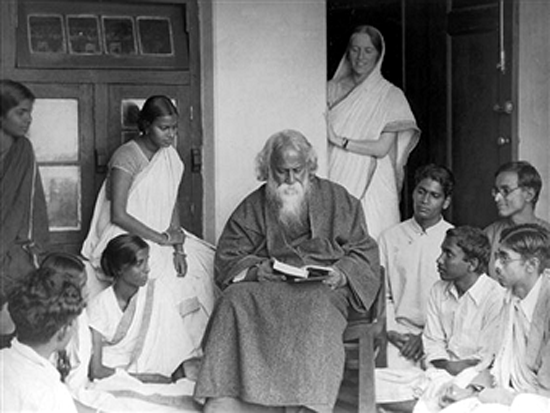Dec 16, 2025
Dec 16, 2025
Excerpts from Tagore’s Letters & Diaries.
To Sudhindranath Dutta, from Santiniketan

Values are of three types. One is for marketplace, the second for religion and the third for aesthetics, being purely personal. From the last intellect is not banished, but it is secondary. Here the main architect is the person building the image, who can observe form and shape it.. Form does not merely mean that which has area, weight and outline. Here, form attaches some aesthetics which provokes unnecessary interest. Unnecessary because, this interest is the ultimate goal without any more ‘why’ and ‘what’. In this world a ‘person’ is that type, his/her reality is my very own and no other verbiage is above it. My curiosity about a ‘person’ is entirely naïve – beyond question and last answer to all questions.
So I say, creation of form is art- through which with inane inquest I perceive the form of a good song, in rotation of music and rhyme it casts such a spell which from my heart I feel as truth; but don’t feel this ‘wall’ as such. What provokes this perception of truth is that form which has various components, the main being ‘emotion’. Because, through ‘emotion’ our consciousness knows ‘self’ deeply. Even ‘immaculate perception’ as propounded by the yogis is one of Anandam (divine joy), or an emotion to say. ‘Thoughts’ also may be component for creation for art, but not to transcend one to truth. But, the thoughts may be so arranged that will generate a nuance beyond ‘arguments’ into an aesthetic, to give us Anandam without reason, else those would be rabid elephants in a lotus garden.
Words and sentences convey literature. In words there is sound and meaning, both needed in literature, but not for the sole purpose of ‘information’. ‘Information’ will of course be there, but as a subordinate. If it gives a picture and aesthetics, then only it helps create an art. The word ‘empathy’ does not offer any music, picture or aesthetic. But somehow the word ‘compassion’ is accepted. Yet, on intellectual judgment ‘empathy’ is appropriate, accurate and explicit i.e. to be one with others to feel alike with them, which definition goes with the word. Yet, it did not work, as it has explanation but no form. Form embraces a ‘totality’ beyond analysis and does not lob in your mind in isolation.
If you want to build literature placing the intellectual bricks one upon another, each brick cannot contribute there more than its own quantity. But in a tree with life, each segment is superseding itself, possessing a charm which at once manifests the totality. In a literary work, if every word possesses such ‘form’, then the totality is available in each segments. This is called creation.
Originally published in the Bulletin (May 2010) of the Ramakrishna Mission Institute of Culture.
Translation by the author.
References and Source
The January-June 2003 issue of “Shrayan” a compilation from Tagore’s letters and diaries. by the editor of the magazine Mr. Pathik Basu.

|
1 May 2012 TO: Mr. R. D. Ashby At least I could not grasp well Tagore's theisis on 'creation' as propounded in this letter. Elsewhere, I came across his thoughts on 'creation' which appeared to me to be more transparent which included the analogy of a tree and/or a child, the products of Nature, particularly in the animation world. Here, the wonder of God's animation yields a fulfilment to His creations at every stage of their growth say, a seedling or a human baby are fulfilments of their own as opposed to the bricks forming a part of the building (until it is completed). Presumably, Tagore was inclined to classify a poem as a true aesthetic creation when a 'completeness' is inherent in it without being fragile or being separable like a brick of a building. Rajat Das Gupta |

|
With due respect, Tagore like a great many Hindu thinkers justifies a given effect by recourse to simile: just like a tree is a creation so is a poem. However, the bricks in a building form as much a part of the creation of architecture, he discounts in the analogy he employs. His standard for art is something that has to be achieved, rather than, in postmodern terms, something that is in itself, in what ever form it takes, judged good or bad or indifferent according to taste, of intrinsic value. Everything, ultimately, is a creation. Tagore doesn't specify 'a creation of aesthetic value', because to him the distinction doesn't exist. If there is a distinction, then it is arbitrary: simply put, one man's art is another man's junk, and aesthetic quality is really based on a concensus of popular opinion, never universal. |